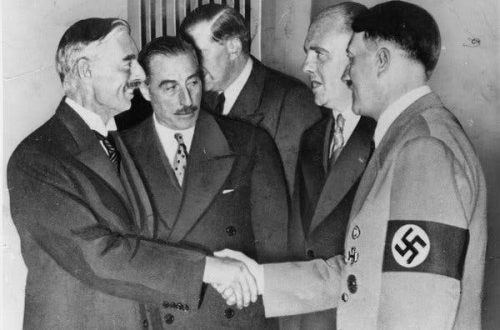On Holocaust Denier David Irving’s website is the following statement:
We regret the passing of Michael Foot, who was so far to the Left that he almost comes up again on the other horizon. Of the post-war memoirs of Sir Oswald Mosley, Foot wrote in The Evening Standard (Oct 22, 1968) that the book could “cast a dazzling gleam across the whole century. . . No rising star in the political firmament ever shone more brightly than Sir Oswald Mosley. . . By general assent he could have become the leader of either the Labour or the Conservative Party. What Mosley so valiantly stood for could have saved this country from the Hungry Thirties and the Second World War.”
In his book Lying About Hitler: History, Holocaust and the David Irving Trial, ([Basic Books, 2002], p.255), the Cambridge historian, Richard J. Evans concurred with David Robson of the Daily Express when he said that Irving was “a propagandist and liar, masquerading as a historian.” Evans also notes (p.248) that Irving once told an audience at the Institute for Historical Review: “You’ve only got to change one or two words and you get a completely different meaning.” The need to be fully truthful is clearly not something that has overly bothered Irving.
In what became known as The David Irving Trial, Judge Charles Gray, who presided over the trial, stated clearly in his judgement:
the correct and inevitable inference must be that for the most part the falsification of the historical record was deliberate and that Irving was motivated by a desire to present events in a manner consistent with his own ideological beliefs even if that involved distortion and manipulation of historical evidence.
Given that I had knowledge of these statements and because I visited the British Library Newspaper section in Colindale yesterday, I realised it would be easy for me to check what Michael Foot actually did say. The full reference of the relevant article is: Michael Foot, “Mosley: the rise and fall of a would-be Caesar,” Evening Standard, October 22, 1968, p. 14.
Irving has correctly quoted Michael Foot, although out of order and he has mangled sentences together that should be separate. Nevertheless we can deal with his quotes.
It is true that Foot stated that Oswald Mosley’s memoirs “could cast a dazzling gleam across the whole century.” The relevant word here is “could.” This is how, in the article, Michael Foot describes what the book actually does do: “it lectures, rants and endlessly regurgitates the supposedly infallible rhetoric of the author.”
Foot commenced his review with the following words that Irving has quoted: “No rising star in the political firmament ever shone more brightly than Oswald Mosley.” In order to see these words in context, I shall quote Foot’s full paragraph:
No rising star in the political firmament ever shone more brightly than Oswald Mosley, none promised more surely to soar to the heavens – and none fell to earth with so deadening a thud. Never were such rich talents so wretchedly squandered. Never did success turn to failure so inscrutably.
Foot did state “by general assent he [Mosley] could have become the leader of either the Labour or the Conservative Party.” However, these words were not followed by the following words which Irving implies they were: “What Mosley so valiantly stood for could have saved this country from the Hungry Thirties and the Second World War.” There is a gap of a number of paragraphs between these sentences and Irving has been dishonest by not using any ellipses to show that this was the case. Let us consider this final sentence quoted by Irving by putting it in context of the next sentence by Foot. Do recall that this article is a book review. I shall quote both sentences together, exactly as they appeared in Foot’s review:
What Mosley so valiantly stood for could have saved this country from the Hungry Thirties and the Second World War. But, alas, at this point, the book, like the life story, collapses.
Having dealt with the out of context quotations by Irving, we can now see what Foot really thought of Oswald Mosley’s memoirs, My Life:
Tortuously we are urged to believe that the Mosley quarrel with “certain Jewish interests” had nothing to do with anti-Semitism, that Mosley’s opposition to immigration and his defence of apartheid had nothing to do with racialism, that the thugs who could spread terror in the poor East End houses were uniformed John Stuart Millses, solely concerned to champion free speech….
Page after page, the self adulation grows more strident, the egotism overpowers. At last the man who saw himself as Caesar looks more like a posturing Coriolanus. He cannot tear himself away from the looking-glass where he cuts so fine a figure to the real world where he stooped so low.
There is no reason for me not to concur with the views of Richard Evans and Judge Charles Gray.


